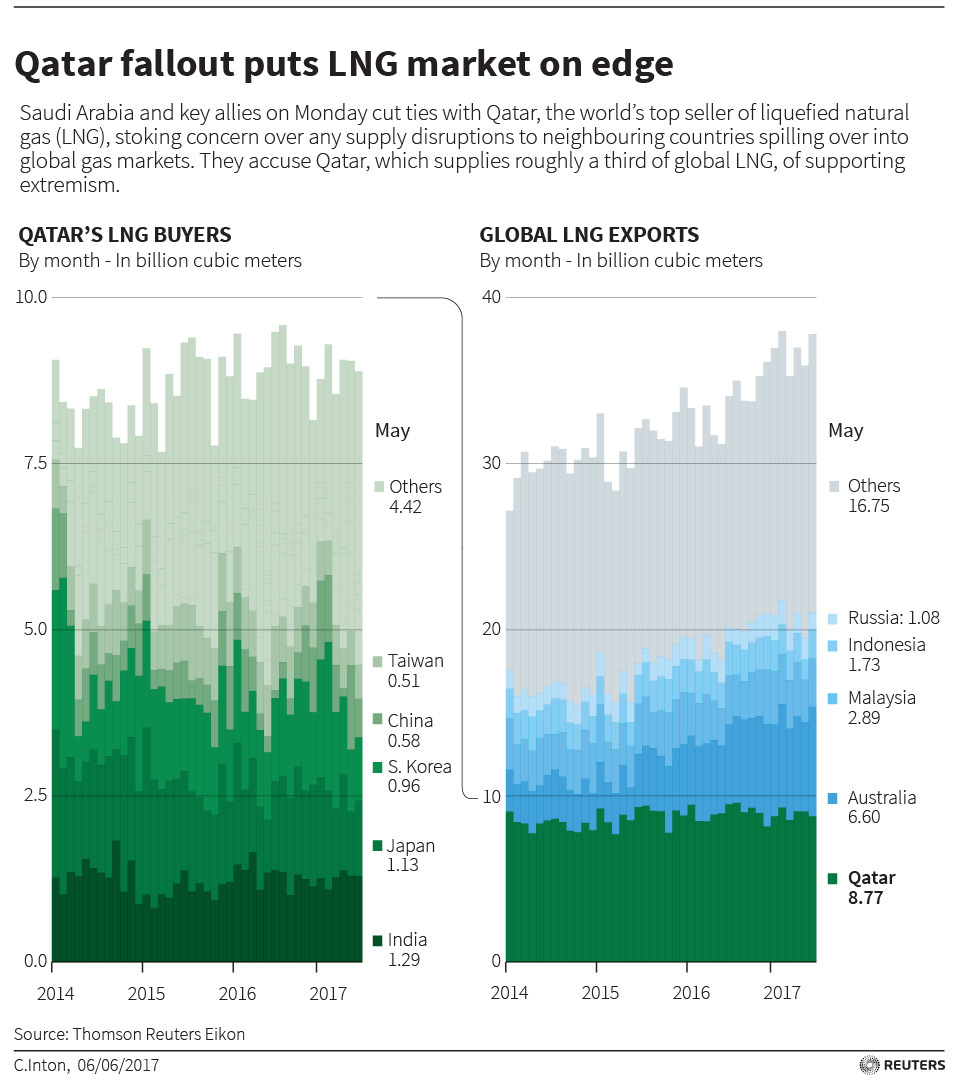
By Sylvia Westall and Tom Finn
DUBAI/DOHA (Reuters) – The United Arab Emirates tightened the squeeze on fellow Gulf state Qatar on Wednesday threatening anyone publishing expressions of sympathy toward it with up to 15 years in prison, and barring entry to Qataris.
UAE Minister of State for Foreign Affairs Anwar Gargash also told Reuters there would be more curbs if necessary and said Qatar needed to make iron-clad commitments to change what critics say is a policy on funding militants.
Qatar vehemently denies any such backing.
Efforts to defuse the regional crisis — triggered on Monday when the UAE, Saudi Arabia, Egypt and others severed diplomatic ties with Qatar over alleged support for Islamist groups and Iran — showed no immediate signs of success.
U.S. President Donald Trump took sides in the rift on Tuesday, praising the actions against Qatar, but later spoke by phone with Saudi King Salman and stressed the need for Gulf unity.
His defense secretary, James Mattis, also spoke to his Qatari counterpart to express commitment to the Gulf region’s security. Qatar hosts 8,000 U.S. military personnel at al Udeid, the largest U.S. air base in the Middle East and a launchpad for U.S.-led strikes on the Islamic State militant group.
Kuwait’s emir has also been seeking to mediate, meeting Saudi’s king on Tuesday.
Qatar’s sudden isolation has led to the country holding talks with Turkey, Iran and others to secure food and water supplies, according to a Qatari official.
UAE-based newspaper Gulf News and pan-Arab channel Al-Arabiya reported the crackdown on expressions of sympathy with Qatar.
“Strict and firm action will be taken against anyone who shows sympathy or any form of bias towards Qatar, or against anyone who objects to the position of the United Arab Emirates, whether it be through the means of social media, or any type of written, visual or verbal form,” Gulf News quoted UAE Attorney-General Hamad Saif al-Shamsi as saying.
On top of a possible jail term, offenders could also be hit with a fine of at least 500,000 dirhams, the newspaper said, citing a statement to Arabic-language media.
Since the diplomatic row erupted, slogans against and in support of Qatar have dominated Twitter in Arabic, a platform used widely in the Arab world, particularly in Saudi Arabia.
Newspapers and television channels in the region have also been engaged in a war of words over Qatar.
Allegations of Islamist sympathies and support have for years strained Doha’s relations with its Gulf Arab neighbors, who consider movements such as the Muslim Brotherhood a security threat.
The UAE’s state-owned Etihad Airways, meanwhile, said all travelers holding Qatari passports were currently prohibited from traveling to or transiting through the emirates on government instructions.
Foreigners residing in Qatar and in possession of a Qatari residence visa would also not be eligible for visa on arrival in the UAE, Etihad spokesman said in an email.
“This ruling applies to all airlines flying into the UAE,” the spokesman said in the statement.
Those breaking ties with Qatar are the UAE, Saudi Arabia, Egypt, Bahrain, the Maldives, Mauritania and Libya’s eastern-based government. Jordan has downgraded its diplomatic representation and revoked the license of Doha-based TV channel Al Jazeera.
SQUEEZE
Qataris were loading up on supplies in supermarkets, fearing shortages.
One official in Doha, speaking on condition of anonymity, said there were enough grain supplies to last four weeks and that the government also had large strategic food reserves. But talks were underway to ensure supplies.
“We are in talks with Turkey and Iran and other countries,” the official said on condition of anonymity.
He said supplies would be brought in through Qatar Airways cargo flights.
Closing all transport links with Qatar, the three Gulf states who have moved against Doha gave Qatari visitors and residents two weeks to leave. Saudi Arabia, Bahrain and Egypt banned Qatari planes from landing and forbade them from crossing their air space.
“This is a very diverse relationship that Qatar has with the UAE and with Saudi and Bahrain – families, business, travel, interests … It will be quite complex to disentangle, but we are intent on saying we cannot go back to the status quo ante,” Gargash, the UAE minister, told Reuters in an interview.
He said more steps against Qatar, including further curbs on business, remain on the table.
“We hope that cooler heads will prevail, that wiser heads will prevail and we will not get to that,” he said.
MARKETS
Qatar’s stock index was down 1.15 percent after plummeting 8.7 percent over the last two days.
“Tensions are still high and mediation efforts by fellow Gulf Cooperation Council state Kuwait have yet to lead to a concrete solution, so investors will likely remain on edge,” said one Dubai-based trader.
Oil prices dipped on renewed concerns about the efficacy of OPEC-led production cuts due to the tensions, and also over growing U.S. output.
Qatar has said it will not retaliate against the curbs.
“We are willing to sit and talk,” Qatari Foreign Minister Sheikh Mohammed bin Abdulrahman al-Thani told CNN late on Tuesday. He said his country was “protecting the world from potential terrorists”.
A Qatari official, however, said the rift was pushing Doha in the direction of leaving the six-state Gulf Cooperation Council, founded in 1981, “with deep regret”.
Bans on Doha’s fleet using regional ports and anchorages are threatening to halt some of its exports and disrupt those of liquefied natural gas.
Traders on global markets worried that Riyadh’s allies would refuse to accept LNG shipments from the Gulf state, the world’s largest liquefied natural gas exporter, and that Egypt might even bar tankers carrying Qatari cargoes from using the Suez Canal as they head to Europe and beyond.
(Reporting by Sylvia Westall, Hadeel Al Sayegh, Celine Aswad, William MacLean; Writing by Jeremy Gaunt; Editing by Raissa Kasolowsky)










